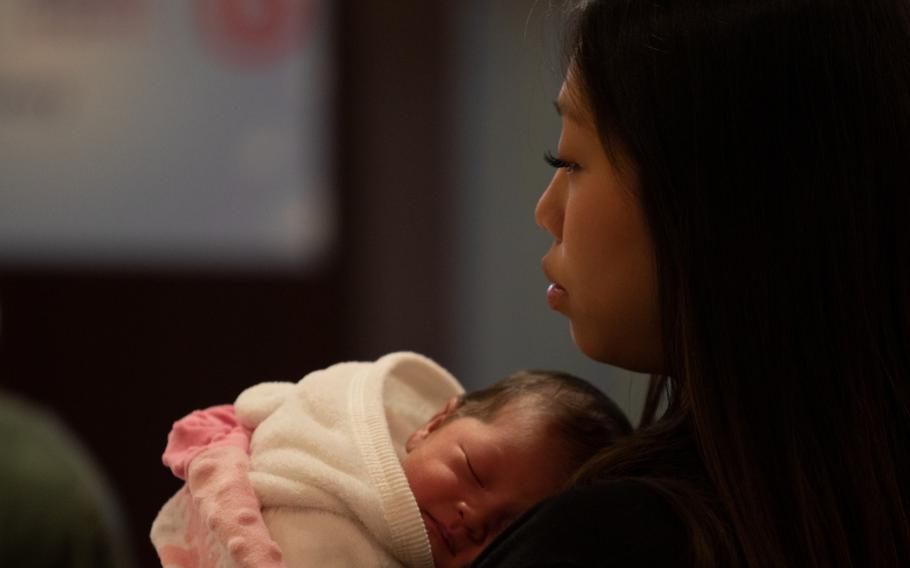
A recent mother comforts her newborn baby at an event at the Tower View Conference Center, Grafenwoehr Training Area, Germany, March 13, 2019. (Jacob Hester-Heardt/U.S. National Guard)
WASHINGTON — Servicemembers and civilians stationed overseas whose son or daughter is not an American now face a new process for applying for their child’s citizenship under policy changes announced Wednesday by the Department of Homeland Security’s U.S. Citizenship and Immigration Services.
The new policy, which goes into effect Oct. 29, addresses the definition of “residence” in the Immigration and Nationality Act and affects children of servicemembers and civilians living abroad who did not acquire citizenship at birth or while they were living in the United States. These children will no longer be considered “residing in the United States,” one of the ways for anyone born overseas to obtain citizenship automatically.
The updated policy is estimated to affect between 20 and 25 people annually, based on data compiled by USCIS during the last five years from overseas applications with Army or Air Force Post Office and Fleet Post Office mailing addresses, according to a USCIS official who spoke Thursday about the policy change on the condition of anonymity.
As of June 30, there are more than 200,000 servicemembers and Defense Department civilians permanently assigned overseas, according to Defense Department data. The number does not include U.S. personnel in Afghanistan, Syria, or Iraq.
But the announcement of a citizenship policy change triggered widespread confusion Wednesday night about what it meant and who would be affected.
“This policy update does not affect [children] born a U.S. citizen, period. This only affects children who were born outside the United States and were not U.S. citizens,” Ken Cuccinelli, the acting director of USCIS, said Wednesday in a statement. “This does not impact birthright citizenship. This policy update does not deny citizenship to the children of U.S. government employees or members of the military born abroad.”
Under Section 320 of the Immigration and Nationality Act, a child who was born outside the United States can automatically become a citizen if they are physically living in the United States with their parent who is a citizen. This section no longer applies for those children living overseas with their parent. The policy update now requires parents who are stationed overseas with their child to file Form N-600K, “Application for Citizenship and Issuance of Certificate Under Section 322,” to apply for citizenship on behalf of the child before he or she turns 18 years old. Parents who submit an application for citizenship before the policy change will have it considered under the old policy.
Parents who are U.S. citizens and whose child is born overseas at a military base or at an off-base hospital outside of the United States can submit for a Consular Report of Birth Abroad to the State Department or a Certificate of Citizenship from USCIS for their child to be a citizen at the time of their birth, according to a USCIS document about the policy change.
Military bases outside of the United States are not considered within the United States for birthright citizenship, so children gain citizenship through their parents, according to USCIS.
The change in the policy guidance was made because it conflicted with the definition of “residence” in the Immigration and Nationality Act, according to the USCIS document. Children of servicemembers were considered residing in the United States under INA 320 and also residing outside of the United States under INA 322, Marilu Cabrera, a spokeswoman with USCIS, wrote in an email. The guidance now clarifies these children are considered living outside of the United States.
Families can go to the USCIS Military Resource Page (https://www.uscis.gov/military) for information about the policy change, according to Lt. Col. Carla Gleason, a Pentagon spokeswoman. Servicemembers can also reach out to their branches’ Service Legal Assistance as well.
Kenney.Caitlin@stripes.com Twitter: @caitlinmkenney